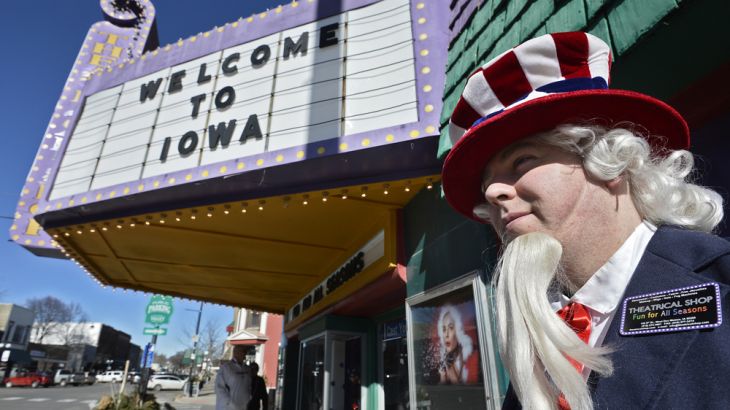Candidates compete for Iowa caucus supremacy
Presidential hopefuls from both parties fight for first place in Iowa after months of campaigning and spending millions.

The thing to remember about the Iowa caucuses is there is always a surprise.
George HW Bush finished third in Iowa in 1988, the year he was expected to top the poll. He went on to secure the nomination.
Barack Obama surprised everyone with a comprehensive victory in the state eight years ago.
And last time round, Rick Santorum was polling in the single figures not long before the caucus and went on to win over Mitt Romney.
So it’s safe to say we should expect a surprise on Monday night.
Skewed polls
Polls in the state are often skewed because there’s no way to model a surge of supporters coming out at the last minute.
And that’s why the result often comes down to a battle between momentum and management.
For the Democrats, Hillary Clinton’s campaign has been organising in the state for more than year. It’s spent millions building on the information gathered by the successful Obama campaign, identifying voters, talking to them, trying to enlist their support.
Meanwhile, Bernie Sanders is looking at polls that have shown him cut an almost 50 point lead to put it into a statistical tie.
He’s looking at the eager young faces attending his rallies and wondering if they’ve ever been asked by pollsters how they’ll vote. And the Vermont senator hopes he’s built up such a head of speed it’ll be enough to send him past the former secretary of state into first place.
On the Republican side, Ted Cruz has built up a formidable operation. He has contacted eligible voters at least twice, organised campaign chairs in every one of Iowa’s 99 counties and has precinct captains in most places.
His get-out-the-vote effort will ensure a high finish.
Meticulous management
But the Texas senator’s meticulous management will be put to the test by the momentum of two other candidates.
Cruz was leading in the polls at the start of the year but may have peaked too early.
He talked about winning Iowa, and that was a mistake. It let the expectation game get out of hand, to the extent where even a second place might look like a bad loss
He’s had two difficult debates and drawn the fire of other candidates. That’s seen his poll numbers drop.
Meanwhile, Marco Rubio is pushing through. The Florida senator spent the weekend saying he could be the “big surprise” in Iowa. His team even issued a number of media releases saying how well he was doing.
That’s the sign of a campaign that believes the polls, which put their candidate in third place.
And then there’s Donald Trump. It used to be said to win in Iowa you almost had to move there. Trump has attended events, then taken his private jet back to his New York apartment.
He’s spent less on TV advertising than any other leading candidate. Instead he’s soaked up the free media provided by the channels that have carried his every move live, taken almost every speech in its entirety, even when he had nothing new to say, and watched as his poll numbers increased.
A disappointing performance in Iowa often means the end of the line for a candidate, the dreams of the White House have to be packed away.
And while winners don’t always become President – those who exceed expectations gain a momentum of their own.